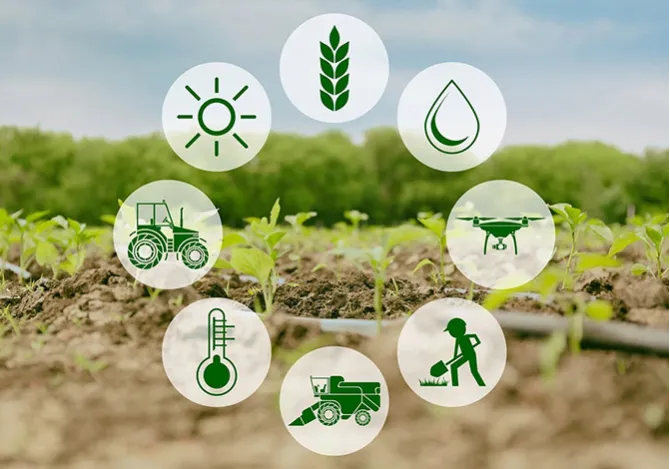
India's agriculture sector is a cornerstone of its economy. Accounting for 18.3 percent of its gross domestic product (GDP) and employing 158 million people in 2022-23, agriculture is not simply an economic activity but a way of life for millions. As India’s population continues to surge—it is projected to touch 1.515 billion in 2030, making India the world’s most populous country—ensuring food security will become increasingly crucial. Indeed, Indian agriculture now finds itself at a crossroads, having to adapt rapidly to the demands of a growing middle class and the impacts of climate change. This has prompted a pivot towards the smart use of technology to improve agricultural efficiency, sustainability, and resilience.
The governmental push for agritech
Agritech refers to an ecosystem of enterprises, startups, and solutions that leverage tech advancements to deliver products or services for increasing crop yields, enabling a range of efficiencies, and ultimately boosting profitability for farmers across the agriculture value chain. India is currently home to more than 3,000 agritech startups, of which over 1,300 use emerging and disruptive technologies (EDTs) such as artificial intelligence (AI), machine learning, and the Internet of Things to support agricultural operations.
Indian agriculture now finds itself at a crossroads, having to adapt rapidly to the demands of a growing middle class and the impacts of climate change.
Recognising agritech’s quick expansion and growing importance, the Indian government has thrown its weight behind the sector. In her 2023 Budget speech, for instance, the finance minister announced the launch of an accelerator fund to boost agritech startups, and to support rural entrepreneurs by providing them with the necessary tools and technologies. The Indian government had earlier allocated over USD 290 million and USD 210 million in 2021-22 and 2020-21 respectively for states to introduce EDTs including drones, Artificial Intelligence (AI), blockchain, remote sensing, and geographic information systems in agriculture. Moreover, the landmark National Strategy for Artificial Intelligence (2018) expressly identifies agriculture as a space where a broad spectrum of AI use cases could hasten sectoral growth.
India Stack, the umbrella architecture for India’s immensely successful model of digital public infrastructure (DPI), has revolutionised public service delivery and unleashed innovation on an unprecedented scale. Besides enabling the creation of foundational DPIs such as the Aadhaar digital identity (ID), and the Unified Payments Interface, tech stacks are being used to build sectoral DPIs as well. A key example of this is AgriStack, a novel agriculture-focused DPI that India is currently in the process of implementing. AgriStack consists of a federated farmers’ registry along with related digital agricultural services and applications. Collectively, these components will support farmers and agricultural workers on the one hand, and governments and agribusinesses on the other.
The umbrella architecture for India’s immensely successful model of digital public infrastructure (DPI), has revolutionised public service delivery and unleashed innovation on an unprecedented scale.
AgriStack’s digital repository of farmers—where each farmer will be assigned an Aadhaar-like unique ID, linked to her land records—is expected to streamline the targeted delivery of subsidies and services. The data of over 43 million farmers has been verified till date. Simultaneously, the Indian government is building a unified farmer service platform that will digitise the delivery of agri-services by the public and private sectors. While the AgriStack ecosystem is expected to benefit the small-scale and marginal farmers who constitute the bulk of India’s agricultural workforce, two sets of concerns have been raised, efforts to resolve which are ongoing. First, many farmers’ land records are not updated – hence tying the farmer ID system to these records is not likely to be foolproof. Second, there are fears about farmers’ personal data being shared with private entities, which could lead to potential data mismanagement, data breaches, or the profiling of individuals. The effective operationalisation of the Digital Personal Data Protection (DPDP) Act 2023 could, however, act as a bulwark against these risks.
State governments have been quick to enter into strategic partnerships with private actors and international bodies to roll out agritech solutions. Under the World Economic Forum’s AI for Agricultural Innovation (AI4AI) initiative, for example, the Telangana government launched the Saagu Baagu[1] pilot project to scale up the use of emerging tech to boost agricultural productivity. As of early 2023, over 7,000 chili farmers in the state had obtained access to services that included AI-based advisories, e-commerce, and tech-driven soil testing mechanisms.
Global partnerships
India’s agritech prowess is gradually being recognised worldwide. In mid-2023, India’s first precision agriculture startup, Fyllo, entered into strategic partnership with Spain-based Terraview, a global climate software-as-a-service firm, to improve the productivity of wine producers across the US, Australia, and Spain. This collaboration has made Fyllo—the first Indian agritech company to expand globally, and it will soon introduce smart agricultural processes to vineyards in Italy, France, and Mexico too.
Earlier in 2023, on the sidelines of the I2U2 Business Summit, India joined the Agriculture Innovation Mission for Climate (AIM4C) launched by the United States (US) and United Arab Emirates (UAE), with the objective of accelerating investment and support for climate-smart agriculture and food systems innovation. Membership of the AIM4C makes India a part of a global alliance of over 275 partners. Importantly, it also serves to strengthen Indo-UAE agri-cooperation at a time when the UAE has pledged to invest US$ 2 billion in developing food parks in India to help Indian farmers find higher prices for their goods, and to create a new generation of non-farm agricultural jobs.
The hub is transferring agricultural innovations from India to Bangladesh and Nepal to help address food security and nutrition challenges.
Between 2017 and 2020, India and the US Agency for International Development (USAID) helped design and establish an independently operated and financially viable South Asia AgTech Hub for Innovation (SAATHI). The hub is transferring agricultural innovations from India to Bangladesh and Nepal to help address food security and nutrition challenges. Providing agri-support to other nations of the Global South continues to be a priority for India.
What lies ahead?
There is enormous scope for Indian agritech to grow further. Despite the strides made so far and the sector’s expanding global footprint, agritech in the country is still at a nascent stage and has penetrated only 1 percent of its potential market value of US$ 24 billion. Given the vastness of the yet untapped Indian market, opportunities abound for startups and other new agri-enterprises to make their mark.
There is every indication that AgriStack will be a game-changer. Even as efforts to compile a national farmer registry continue apace, the mammoth task of updating farmers’ land records and checking land ownership should be accelerated. Strong data protection mechanisms adhering to the letter and spirit of the Digital Personal Data Protection Act (DPDP) also need to be put in place to allay prevailing fears about the security and confidentiality of farmers’ personal data. Besides, newer kinds of agri-services could be introduced. For instance, transaction data from crop mandis could be integrated with AgriStack’s digital ecosystem, generating insights that benefit both buyers and sellers.
Strong data protection mechanisms adhering to the letter and spirit of the Digital Personal Data Protection Act (DPDP) also need to be put in place to allay prevailing fears about the security and confidentiality of farmers’ personal data.
Promoting digital literacy in the agricultural sector will need to move to the top of the agri-development agenda. Farmer Producer Organisations (FPOs) could play an important role in implementing digital literacy initiatives and educating farmers. FPOs are also uniquely well placed to build partnerships with institutional retailers and food processing companies, incentivising farmers to improve the quality of their produce, and driving the adoption of agritech in the process.
As India continues to strengthen its startup ecosystem, startups should be coached to better demonstrate scalability and higher unit economics to investors. This is particularly true for agritech startups, which often face the additional challenge of having to innovate within the agriculture value chain without disrupting traditional channels and to build networks with stakeholders such as FPOs, distributors, and food processors from inception.
Finally, a stronger culture of agritech research ought to be fostered, with associated international exchange programmes to help share knowledge. With supportive policies, strategic investments, a pool of tech talent, and the cross-border sharing of best practices, the Indian agriculture sector will be better equipped to ensure its own sustainability and contribute to the global food system.
Shrushti Jaybhaye is a Research Intern at the Observer Research Foundation
Anirban Sarma is a Deputy Director and Senior Fellow at the Observer Research Foundation
[1] In Telugu, this translates as ‘agriculture advancement’.
The views expressed above belong to the author(s). ORF research and analyses now available on Telegram! Click here to access our curated content — blogs, longforms and interviews.




 PREV
PREV



